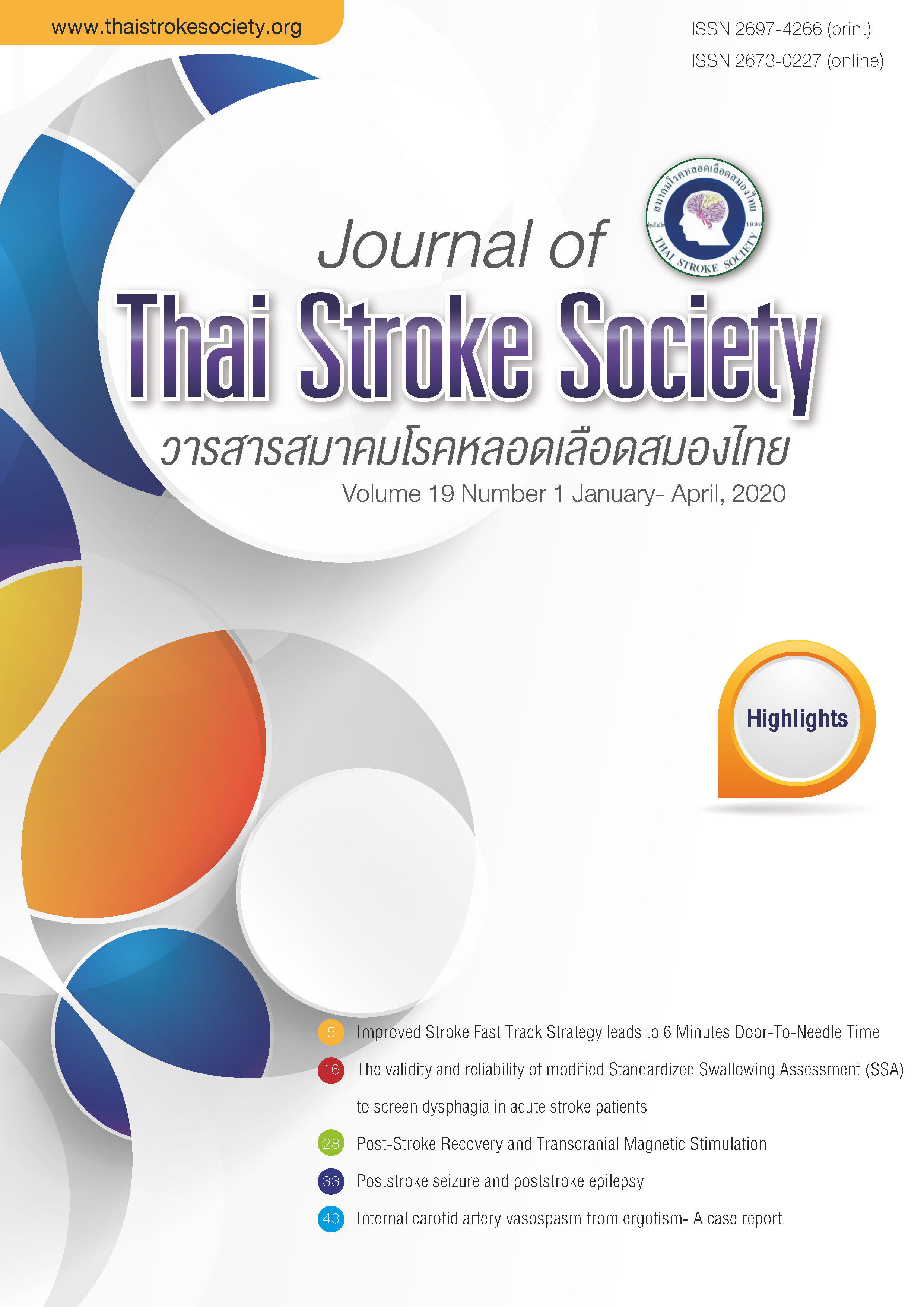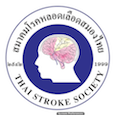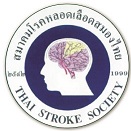The validity and reliability of modified Standardized Swallowing Assessment (SSA) to screen dysphagia in acute stroke patients
Keywords:
Bedside swallowing screening test, acute stroke patients, dysphagiaAbstract
Objective: This study aimed to assess the validity and reliability of the developed bedside
swallowing screening test that modified from Standardized Swallowing Assessment (SSA).
Methods: The developed screening test was modified from the SSA form by changing
the amount of water and adding food tests. Three experts appraised the validity of the modified
swallowing screening test. Then, the test was evaluated to 100 acute stroke patients who were
admitted to the acute stroke ward at Ramathibodi Hospital during October - December 2019.
Data were collected by two independent registered nurses. The reliability was calculated
using Cohen’s kappa. Moreover, follow up one month after discharge from the hospital was
made to track that the passed patient had no aspiration pneumonia.
Results: The results showed that confidence (Cronbach’s alpha) of the tool was 0.798.
The interrater reliability for the full assessment was kappa 0.83. The interrater reliability for
each item was Kappa 0.928-1.00. The subjects were mostly male, 62%, with a mean age of
63±15 years old. Ischemic stroke was the typical type of stroke 74%, intracerebral hemorrhage
14%, and TIA 11%. Ninety-four subjects passed the swallowing screening test. All patients
who passed the trial did not have a history of aspiration pneumonia after 1-month follow-up.
Conclusion: The validity of the developed bedside swallowing screening test was 0.798,
with excellent reliability. This developed screening test was beneficial to detect and prevent
the patient at risk of dysphagia in an acute stroke patient.
References
2. ปิยะภัทร เดชพระธรรม. ปัญหาการกลืนในผู้สูงอายุ. เวชศาสตร์ฟื้นฟูสาร. 2556;23:73-80.
3. Antinios N, Carnaby-Mann G, Crary M, Miller L, Hubbard H, Hood K, et.al. Analysis of a physician tool for evaluating dysphagia on an inpatient stroke unit: the modified Mann Assessment of Swallowing Ability. J Stroke Cerebrovasc Dis. 2010;19(1):49-57.
4.พรชัย สถิรปัญญา. ภาวะการกลืนผิดปกติในระบบประสาท. สงขลานครินทร์เวชสาร. 2550;25:561-568.
5. Powers WJ, Rabinstein AA, Ackerson T, Adeoye OM, Bambakidis NC, Becker K, et al. 2018 guidelines for the early management of patients with acute ischemic stroke: a guideline for healthcare professionals from the American Heart Association/American Stroke Association. Stroke. 2018;49(3):e46-e99.
6. Joundi RA, Martino R, Saposnik G, Giannakeas V, Fang J, Kapral MK. Predictors and outcomes of dysphagia screening after acute ischemic stroke. Stroke. 2017;48(4):900–906.
7. Campbell GB, Carter T, Kring D, Martinz C. Nursing bedside dysphagia screen: Is it valid?. J Neurosci Nurs.2016;48(2):75-79.
8. Ellis AL, Hannibal RR. Nursing swallow screen: Why is testing water only not enough?. J Neurosci Nurs.2013: 45(5): 244- 253.
9. สมสุดา ยาอินทร์, เอกสิทธิ์ ภู่ศิริภิญโญ, ภัทรา วัฒนพันธุ์. ความสอดคล้องของการประเมินภาวะกลืนลำบากสำหรับผู้ป่วยโรคหลอดเลือดสมองโดยพยาบาล. เวชศาสตร์ฟื้นฟูสาร. 2555; 22: 27-33.
10. Ramsey DJ, Smithard DJ, Kalra L. Early assessments of dysphagia and aspiration risk in acute stroke patients. Stroke.2003;34(5):1252-1257.
11. รุ่งทิวา ชอบชื่น. บทบาทพยาบาลในการฟื้นฟูสภาพผู้ป่วยที่มีภาวะกลืนลำบาก. ศรีนครินทร์เวชสาร.2014;29:13-15.
12. Brodsky MB, Suiter DM, González-Fernández M, Michtalik HJ, Frymark TB, Venediktov R, et al. Screening accuracy for aspirate using bedside water swallow tests: A systematic review and meta-analysis. Chest.2016;150(1):148-162.
13. Vividaki LE, Nasios G, Kosmidou M, Giannopoulos S, Milionis H. Swallowing and aspirate risk: A critical review of non-instrumental bedside screening test. J Clin neurol. 2018;14(3):265-274.
14. Horiguchi S, Suzuki Y. Screening test in evaluating swallowing function. JMAJ.2011; 54(1):31-34.
15. ไพฑูรย์ เบ็ญจพรเลิศ, ปรีดา อารยวิชานนท์, ณัฐเศรษฐ มนิมนากร, ภัทรา วัฒนพันธุ์. ความชุกของภาวะกลืนลำบากระดับช่องปากและลำคอในผู้ป่วยโรคหลอดเลือดสมองระยะเฉียบพลันที่โรงพยาบาลศรีนครินทร์. เวชศาสตร์ฟื้นฟูสาร. 2561; 28:49- 53 .
16. Fedder WN. Review of evidenced –based nursing protocol for dysphagia assessment. Stroke.2017;48(4): e99 -e101.
17. Osawa A, Maeshima S, Tanahashi N. Water-swallowing test: screening for aspiration in stroke patients. Cerebrovasc Disease.2013;35(3):276–281.
18. Perry L. Screening swallowing function of patients with acute stroke. Part two: detailed evaluation of the tool used by nurses. J Clin nurs.2001;10(4):474-481.
19. Cichero JAY, Lam P, Steele CM, Hanson B, Chen J, Dantas RO, et al. Development of International Terminology and Definitions for Texture-Modified Foods and Thickened Fluids Used in Dysphagia Management: The IDDSI Framework. Dysphagia. 2017;32(2):293-314
20. Cantor AB. Sample-size calculation for Cohen's kappa. Psychological Methods, 1996;1, 150-153.
21. Nachmias CF, Nachmias D. Research methods in the social sciences. London: Arnold,1998: 467.
22. Landis JR, Koch GG. The measurement of observer agreement for categorical data. Biometrics.1977;33(1):159–174.
Downloads
Published
How to Cite
Issue
Section
License
ข้อความภายในบทความที่ตีพิมพ์ในวารสารสมาคมโรคหลอดเลือดสมองไทยเล่มนี้ ตลอดจนความรับผิดชอบด้านเนื้อหาและการตรวจร่างบทความเป็นของผู้นิพนธ์ ไม่เกี่ยวข้องกับกองบรรณาธิการแต่อย่างใด การนำเนื้อหา ข้อความหรือข้อคิดเห็นของบทความไปเผยแพร่ ต้องได้รับอนุญาตจากกองบรรณาธิการอย่างเป็นลายลักษณ์อักษร ผลงานที่ได้รับการตีพิมพ์ในวารสารเล่มนี้ถือเป็นลิขสิทธิ์ของวารสาร





